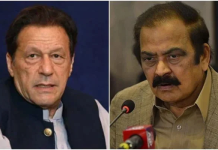ISLAMABAD: Chief Justice Yahya Afridi has said that Pakistan Tehreek-e-Insaf (PTI) founder Imran Khan’s request pertains to Article 184(3) of the Constitution, thus, the matter has been forwarded to the committee and will be handled by the constitutional bench.
The CJP made the comments during his interaction with journalists in Islamabad. “I have asked the committee to review the letter and make a decision,” the top judge said.
“The letter has been forwarded to the judges’ constitutional committee, which will determine the course of action. Since the matter pertains to Article 184(3), it must be addressed by the constitutional bench,” he clarified.
He revealed that the decision to forward the PTI founder’s letter to the committee had already been made a day earlier.
His interaction with the media person came following a one-hour meeting between the CJP and a six-member delegation from the International Monetary Fund (IMF) at the Supreme Court.
Chief justice briefs IMF delegation
During the meeting, the chief justice briefed the IMF delegation on Pakistan’s judicial system and ongoing reforms. The discussion also covered the appointment of judges and constitutional amendments.
Chief Justice Afridi, apprising the reporters, said that he informed the IMF delegation that the judiciary operates independently under the Constitution. He added that it was not the judiciary’s role to provide the IMF with all the details they sought.
“I informed the delegation about the agenda of the National Judicial Policy-Making Committee (NJPMC). The supervision of subordinate courts falls under the jurisdiction of high courts.
The delegation expressed interest in Pakistan’s adherence to agreements and property rights, to which I responded that reforms are underway,” he said.
According to Chief Justice Afridi, the IMF delegation was briefed on judicial reforms and the national judicial policy.
“The delegation provided suggestions regarding the protection of property rights. I assured them that we would consider their recommendations. They were also informed that special benches would be formed in high courts to expedite hearings,” he added.
The chief justice further revealed that the IMF delegation emphasised the need for foreign investment protection in Pakistan. In response, he said: “We would require artificial intelligence (AI) for the judiciary’s efficiency.”
The CJP emphasised the importance of transparency regarding the visit of the IMF delegation to the Supreme Court, saying that the public has the right to know the facts.
CJP Afridi revealed that Prime Minister Shehbaz Sharif had sent him a letter informing him of the IMF’s concerns.
In response, he conveyed a message to the prime minister through the attorney general, stating that he would not reply to the letter in writing. Instead, he invited the prime minister to visit the court alongside the delegation.
IHC judges’ letters
Chief Justice Afridi further disclosed that six Islamabad High Court judges who wrote a letter regarding interference in judicial affairs were invited to his residence after taking their oath.
He added that the issue of interference is always the first agenda item in every Supreme Judicial Council meeting.
Addressing concerns over the practice of writing letters, the chief justice remarked that such habits would improve over time. He noted that the judges who penned the recent letter should have exercised patience before making their concerns public.
“We need to solve issues rather than mix them up,” he said, adding that trust in the system is crucial.
The chief justice announced that, starting next week, two permanent benches would exclusively hear criminal cases. Additionally, he confirmed that death penalty cases are being scheduled for expedited hearings.
“Cases will only be fixed for hearing when new judges are appointed,” he clarified.
Speaking about judicial appointments, Chief Justice Afridi disclosed that he had invited high court judges to his residence on October 26 after they took their oath.
Meanwhile, the chief justice announced that a meeting of the Judicial Policy-Making Committee is being convened to discuss judicial reforms.
He reaffirmed his commitment to carrying out responsibilities within his authority, dismissing allegations of “court packing” as baseless.
“The transfer of judges from high courts and their seniority are two separate matters and should not be confused,” he asserted.
Reflecting on a recent letter written by four judges, he expressed surprise that it had been broadcast on television before even being opened.
“I fail to understand why they do not wait and instead go into panic mode,” he remarked. He added that he always voices his concerns at the appropriate forum and time.
Additionally, he highlighted the role of Justice Miangul Hassan Aurangzeb, stating that he was appointed as an acting judge due to his expertise in tax cases.
The chief justice expressed his intent to bring Justice Aurangzeb to the Supreme Court and mentioned that his name would be reconsidered in the upcoming Judicial Commission meeting.
‘Everything will gradually be set right’
On the Judicial Commission’s proceedings, he reiterated that he had already expressed his opinion in the meeting and acknowledged that judicial review could be applied to his stance.
He recalled that during a commission meeting, one chief justice had remarked that other members had nominated even more suitable candidates.
“Had there been no boycott yesterday, another competent judge could have been appointed to the Supreme Court,” he added.
Moreover, he said: “I expect the agenda for the National Judicial Committee to be finalised by tomorrow,” he noted, adding that Leader of the Opposition Omar Ayub had also been asked for suggestions.
He emphasised that input had been sought from both the prime minister and the opposition leader on matters related to justice delivery.
When asked about internal judicial differences, the chief justice remarked that previous practices among judges persist, and it will take time for them to change.
“Everything will gradually be set right,” he assured. He highlighted recent changes within the JCP, saying that any member could now propose a name for consideration. “Excellent judges are being brought in,” he remarked.
Chief Justice Afridi reaffirmed his belief in allowing the judicial system to function without obstruction. “I have asked my fellow judges to let the system run smoothly rather than hinder it,” he said.

















